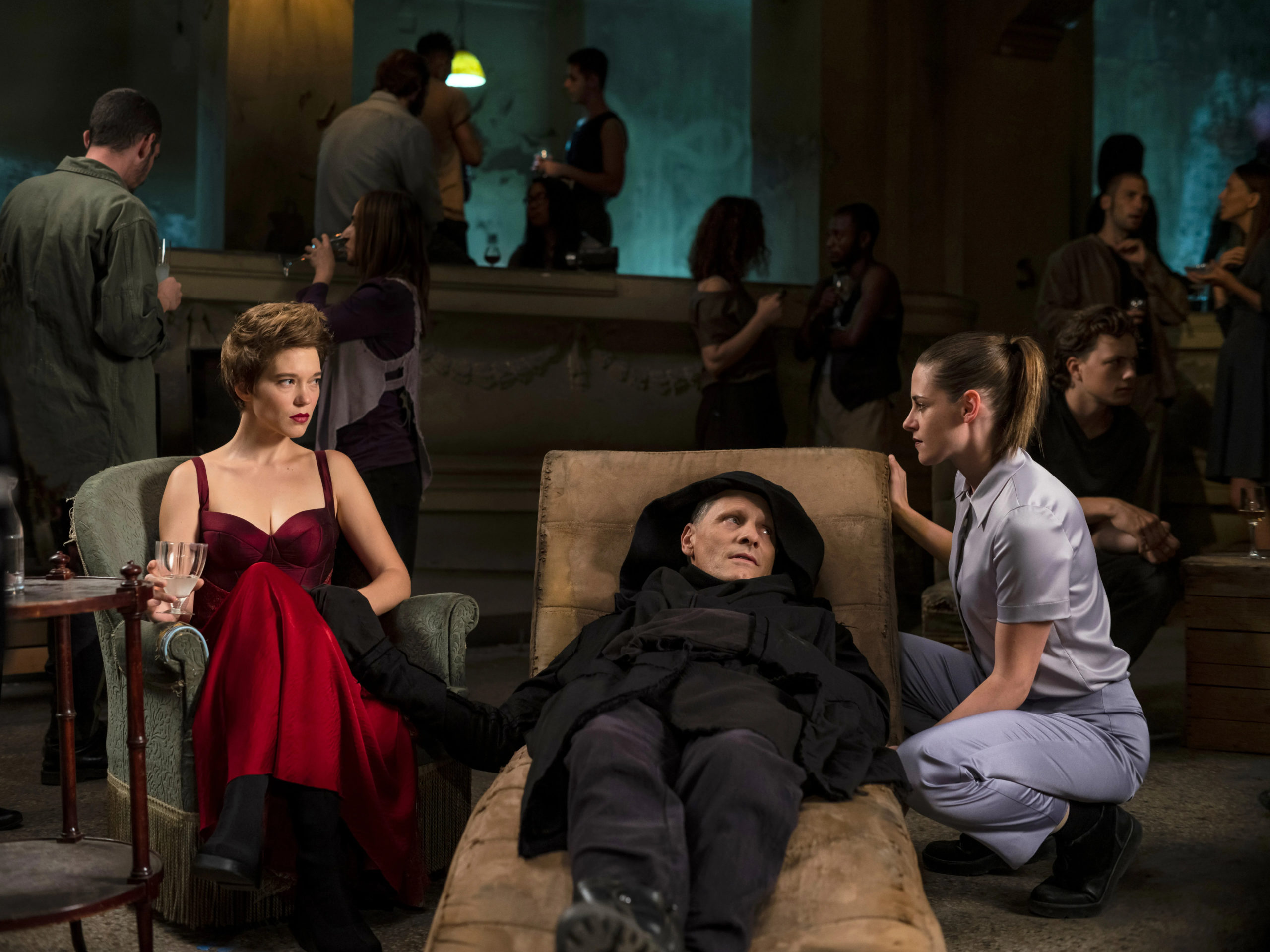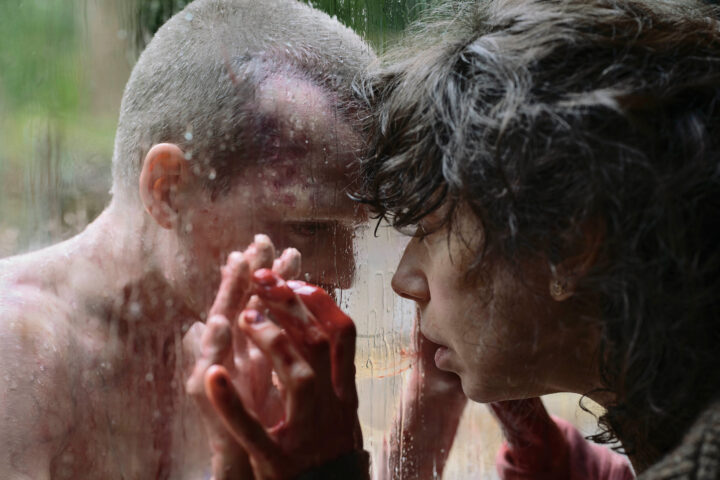Crimes of the Future, David Cronenberg’s latest provocation, about a dystopian world where humans feel no pain, somatic mutations reign and surgical procedures are aphrodisiacal performance art, finds the Canadian auteur comfortably in his wheelhouse of envelope-pushing body horror, visionary sci-fi and icy social critique—a fusion of genres he all but patented five decades ago.
Cronenberg, the master filmmaker, is unparalleled in crafting such prophetically unnerving explorations, which have included the merger of man, machine, sex, violence and media (Videodrome); the evolution of the body toward the unsavory and insatiable (Rabid); perverse pathologies deploying medical instruments of torture (Dead Ringers); shadowy corporate or government “research” entities indulging in exploitation (Scanners, The Brood); and symbiotic sex partners locked in unorthodox fetishes (Crash). Each of these cinematic predilections re-emerge in Crimes of the Future, purportedly the seventy-nine-year-old filmmaker’s final picture, which plays like a greatest hits reprise of the filmmaker’s most prevalent obsessions.
The picture opens in a very near future dystopia where the human body has adapted, of its own volition, mutating toward new internal organs (and in some cases, digestive tracts) as well as the inability to feel pain. “Surgery is the new sex” we’re told, and for showman Saul Tenser (Viggo Mortensen), this means a wildly lurid self-surgical routine as performance art, where he slices open his abdominal cavity to reveal mysterious new organs, much to the sensual delight of fetishists.
His partner in work and love is assistant Caprice (Lea Seydoux, terrific), who ensures the “operations” are appropriately administrated, which includes, on occasion, tattooing his insides before theatrical extraction. Such art-world satire finds Cronenberg on firm footing in imagining a next gen, avant-garde evolution of show business into the depraved. Despite the high-wire absurdity of the material, Mortensen and Seydoux manage chemistry and intrigue.
Tenser is a well-known cult phenom, whose admirers include a pair of would-be bureaucrats from the National Organ Registry, a classic Cronenberg entity and secret government program in charge of keeping tabs on organ aberrations under the premise that “human evolution is going wrong.” If so, what can they do about it? Yevgeny (Don McKellar) and Timlin (Kristen Stewart, speaking in rushed, halted tones) may be ambassadors of the program but nonetheless find themselves starstruck by Tenser, Timlin developing a near-romantic fixation.
The film also imagines a clandestine cult dedicated to radical digestive mutations (including the body’s ability to assimilate plastic), led by a father (Scott Speedman) whose murdered son was the prototype for a major genetic metamorphosis; opponents of the cult’s twisted plans for human evolution; and a detective (Welket Bungue) three steps behind everyone else. There’s also a superbly designed skeleton-like chair composed of bones which swivels in various directions and (I think) helps Tenser digest meals. Whatever the purpose, it is a terrific effect.
The various plots intersect in intermittently interesting ways, but despite moments of arresting visual invention (including a performance artist with ear mutations across his body and sewn-up lips), the picture’s potential and impact is largely unrealized as each of these plot directions feel more rudimentary than truly explored.
Crimes of the Future plays as a greatest hits homage to the filmmaker’s estimable repertoire, and many of the film’s narrative and visual devices will be identifiable to the Cronenberg faithful. Yet the film is a sum-of-its-parts proposition; it often feels dispassionate to a fault, and it ultimately tries to do too much, including the addition of a law enforcement procedural that feels unnecessary. Nearly everything here has been done better in his other films, producing the effect of narrative regurgitation. For the Cronenberg uninitiated, the picture may well hit its targets; for anyone familiar with his best films (with Videodrome at the top of a long list), this one registers as lesser tier.
Still, a merely acceptable Cronenberg film with such bold ideas and thematic ambition still stands tall against nearly everything else being released in 2022. This time, though (and despite the viscera on display) the picture curiously lacks guts; it’s a mind-fuck minus much worth caring about. Even the shock vision of a young boy’s nude cadaver, mutilated for public consumption, produces little audience response beyond cool bemusement. Perhaps that is Cronenberg’s point in a world where we have become numb to both our pain and our humanity.
The film feels numb as well.
2 1/2 stars.




I liked it a little more than you (I’d go 3 stars), I think, though “dispassionate” is a fair assessment. Cronenberg has several films — including some very good ones, like “Crash” and “Cosmopolis” — where an emotional iciness is evident, along with mordant wit. All his films (well, maybe not “Fast Company”) are intellectual, but for me, the best merge that with a little more emotion…usually of a deeply melancholy variety. I like “Videodrome,” but I would say it has some of that same dispassionate quality in spite of Wood’s energy in the lead. That’s your pick for his best, eh? Interesting choice. It’s mid-tier for me, but as I don’t dislike any of his work, that’s not a slam at all. It’s a true original and “Crimes” owes a lot to its spirit and rundown, urban setting. For me, “Naked Lunch” remains his masterwork. I’m sure you’ve heard since you wrote this, but the good news is “Crimes” will not be his last feature: https://variety.com/2022/film/markets-festivals/vincent-cassel-david-cronenberg-the-shrouds-filmnation-cannes-1235263784/